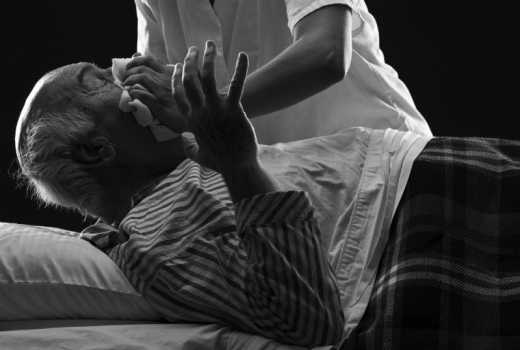
Something strange happened last week. 104-year-old Australian scientist travelled to Switzerland to commit ‘assisted suicide’. This after trying to kill himself in vain. David Goodall, who had been barred from seeking help to do so in his home country because it’s illegal, did not have a terminal illness.
He said his inability to do basic, personal tasks by himself had contributed to his desire to die because he felt he had lost his dignity and self-respect.
This happened against the backdrop of an incident in which a certain Kazungu from the Kenyan coast was a fortnight ago ‘killed’ by medics in the US (as per the country’s laws, which allows health practitioners to do so after a stipulated time for those with no surviving chance).
This was after his family in Kenya refused to give consent for them to pull the plug, despite being told that except for the life support machine, he stood no survival chance.
This is almost similar to what happened in the famous case of Alex Madaga, an accident victim who was kept in an ambulance for 18 hours at Kenyatta National Hospital for lack of an extra ICU bed.
The medics declared that he had no survival chance and asked his family, in vain, to let them switch of the life support machine to save them the soaring medical bill.
Kenyans, and Africans by extension, are confronted by this complex issue of ‘voluntary dying’ or euthanasia, as it’s commonly called in some countries. Some claim it is taboo and would invite the wrath of ancestors or the kin would be haunted by the ghost and spirit of the dead.
Take, for instance, the slow death of former South Africa President, Nelson Mandela. For close to five months after doctors declared him to be in a vegetative state and with no chance of surviving, with his family debating whether or not to switch off the life support machine.
These, among other related incidents, have sparked a debate about switching off life support machines, Advance Directives (Wills of sorts, common in the US, in which patients, upon being admitted, direct doctors on what to do to them in the event they don’t respond to medication) and assisted deaths.
Taboo, un-African
Desmond Tutu, a respected South African man of God who is expected to be pro-life, recently got himself in trouble after he threw a spanner in the works, supporting these assisted deaths in extreme cases.
It got more interesting when a South African court, just the other day, ruled that a terminally ill man, Robin Stransham-Ford, could have a doctor assist his death by lethal injection or lethal medication. The ruling, despite the judge making it clear that it only applied in that case, opened a Pandora’s Box.
The big question, however, is, isn’t this a human right of sorts? Is it an idea Kenyans should entertain? Why wouldn’t an adult of sound mind be denied an opportunity to die in dignity, if they so wish, because they can still do it without any one’s consent, anyway?
Why would patients who know too well they have zero chance of survival or the aged who can’t withstand the indignity of being assisted to do everything, including bathing and visiting the loo, disgrace themselves and suffer so horrendously, despite their clear and informed wish to be killed?
“Euthanasia? Over my dead body!” Most Kenyans are likely to exclaim, lacing their arguments with legal, moral, cultural or biblical underpinnings.
Sin of ‘playing God’?
Robert Burale, a minister of the gospel and a life coach, says the church frowns upon the concept because the Bible says no human being has a right over the life of another.
“No matter how much pain one is in, the good book doesn’t allow any human being to take the life of another. The clarion call is ‘God heals’,” says the pastor.

The life coach, however, warns that sometimes it’s prudent to be realistic. “It’s great to rely on the healing power of Christ, but families should not needlessly accrue large hospital bills, especially when medics have proved no survival chance, as they watch their loved ones suffer great pain. They should empathise and let such patients go to be with angels,” he says.
The pastor says ‘assisted dying’, especially in special and unavoidable circumstances, should not be deemed immoral, because what makes an individual life worth living is very subjective and specific from one person to another.
Our society has increasingly become dynamic. So much so that we have already embraced or tolerate some hot social potatoes that were once uncomfortable like homosexuality, HIV/aids, abortion, among others taboos.
Then, why can’t terminally ill patients or aged adults who can no longer see, walk, talk, hear, read, eat and are permanently bedridden, be allowed to enjoy their freedom and right to die in peace and in dignity?
Despite it being illegal in Kenya, some Kenyans, like Alfred Obege, whom we met on the streets of Nairobi, ‘assisted suicide’ is an idea worth adopting in our laws.
“Personally, I would want to bother my kin in old age. I wouldn’t want to hang around past 80 years of age, where by my kids and grand-kids have to literally assist me do everything,” says 41-year-old Obege.
Indignity of old age
He argues that being spoon-fed, cleaned and your bottom wiped like a baby, ambulated or moved around on a wheelchair or being helped to do basics like brushing teeth is indignity that can make him opt for ‘assisted suicide’.
“After self-actualising, you have grandchildren and done everything and anything you would have wanted to do on this planet, why turn into a bother and lose respect while at it, as you wait to die naturally?” Wonder Obege.
For others like Susan Kendi, this is a great idea to save families from avoidable, big hospital bills, especially in case where doctors have declared that a patient can’t make it and it’s only the life support machine keeping them alive.
“I have heard many cases of patients with zero chance of healing being in ICU for months, increasing medical bills to millions of shillings, which their kin can ill afford and still die. I feel in such cases, assisted deaths should be allowed,” says Kendi, adding that it’s a foreign concept that Kenyan should embrace, seeing as they have done so to many others, like cremation.
Opinion is split among some of the medics Crazy Monday spoke to. Some feel if it’s legalised, it’s a concept they will embrace, while others claims it is against the ethics of their profession.
“We do all manner of things to humans at their request, including amputations, removal of ill or vestigial organs, so long as the consenting party is an adult of sound mind. Why would I, for instance, get scared of helping someone die?” says Felix Maloba, a clinical officer based in Nairobi.
The medic says, if helping terminally ill patients to voluntarily die is akin to playing God, then, helping them to stay alive, too, is playing God.
Maloba says helping such patients commit assisted suicide through lethal injection or taking deadly concoctions doesn’t in any way contravene the ‘do no harm’ principle of the Hippocratic Oath, since the whole process, if legalised, is always consented to by the patient.
“As it is, the medical profession is doing more harm by not helping patients who have expressed desire to meet their Maker. To such patients, ending their life is some sort of comfort or treatment to their pain and suffering. This would also help reduce cases of suicide like is the case in places where this concept is practised,” he says.
Although largely illegal across the world, some countries like the Netherlands, Belgium, Colombia, Luxembourg, Canada and India allow it. It’s also allowed in Switzerland (the only country with centres that offer assisted suicide to foreigners), Germany, South Korea, Japan, and in some states in the US.
In countries where this concept is allowed, stringent measures are in place to ensure it not abused.
 The Standard Group Plc is a multi-media organization with investments in media
platforms spanning newspaper print
operations, television, radio broadcasting, digital and online services. The
Standard Group is recognized as a
leading multi-media house in Kenya with a key influence in matters of national and
international interest.
The Standard Group Plc is a multi-media organization with investments in media
platforms spanning newspaper print
operations, television, radio broadcasting, digital and online services. The
Standard Group is recognized as a
leading multi-media house in Kenya with a key influence in matters of national and
international interest.
